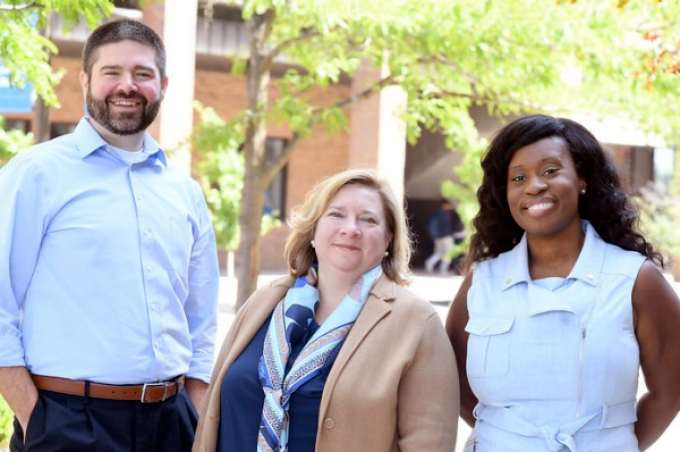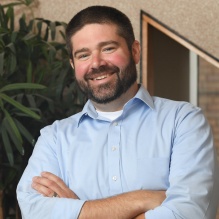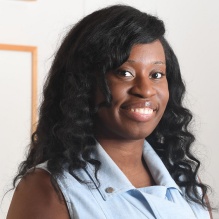
Left to right: Michael Hilburger '11, Bernadette Gargano and Jamila Lee '15.
Doubling up on student support
Michael Hilburger ’11 and Jamila Lee ’15 join Student Affairs Team
When UB Law’s Class of 2025 walked enthusiastically into their orientation program this month, they got their first taste of the full-spectrum of support that will follow them right through to Commencement.
Under the leadership of Bernadette Gargano, vice dean for student affairs, the law school has always made a priority of caring for its students through a stressful three years. Now the Office of Student Affairs has expanded, hiring two new assistant deans with the goal of extending that support and making it seamless.
“With this expansion, we want to be able to broaden what we can offer, provide more service to our students, and make sure we always have more than one person available to respond to needs,” Gargano says. “We’ll be positioned to increase our outreach to our student groups. And as universities put more and more focus on wellness, we want to be sure to have people to help meet that need.”
The office has a broad portfolio that includes academic advising and planning, student groups and activities, accessibility, student health and wellness, and referrals to counseling and other support resources. The new assistant deans—Michael Hilburger and Jamila Lee—bring both professional credentials and their own experiences as UB Law students.
“They’re both lawyers and UB law graduates who have experienced the challenges of attending law school, passing the bar and practicing law,” Gargano says. “They bring that depth of experience to their new positions.”
We checked in with the new team members as they settled into their roles.
Contact Us
314 O’Brian Hall, University at Buffalo (North Campus)
716-645-6223, law-studentaffairs@buffalo.edu
Individual Student Advising
To schedule an appointment, contact Cheri Tubinis
tubinis@buffalo.edu / 716-645-6223
Hours of Operation
Monday - Friday
9:00 a.m. - 4:00 p.m.

Michael Hilburger'11
Michael Hilburger ’11
After four years in private law practice, Michael Hilburger ’11 came back to UB to work in the university’s Office of Student Conduct and Advocacy. As assistant director of that office for seven years, he had primary responsibility for handling the student conduct process, from initial report to adjudication to outcome enforcement. He also oversaw the Students’ Advocacy Program, which helps students to navigate university policies and procedures, and worked with the Student-Wide Judiciary.
One of your new responsibilities is to serve as a liaison to the Student Bar Association and the law school’s other student groups. How do you expect these groups to benefit from your involvement?
An immediate benefit will be the knowledge base that I bring about SUNY, UB and the School of Law. I have been a part of this campus community for over 15 years in many diverse roles: undergraduate, resident, commuter, student worker, law student and professional staff member. I have either navigated myself, helped others navigate or found the right person with the know-how to understand the various and intersecting policies and processes on campus. I hope to use those experiences and that knowledge to help our Student Bar Association and other student groups as they navigate their challenges.
At UB’s Office of Student Conduct and Advocacy, you dealt with some students who got themselves into trouble in various ways. What did you find was the most effective way of getting them back on track?
The most important approach is to be empathetic, understanding an incident from different angles and meeting the student where they are. Most conduct violations are the result of mistakes or poor choices. For many students, higher education is a major step for them both inside and outside the classroom—with new responsibilities, new options, new pressures, new cultural changes, new issues … the list goes on. Working with students to help them understand more than just the consequences of their actions, but what contributed to the incident and how they can grow past it, is an essential tool to helping students develop.
Ever since your graduation, you’ve come back every year to be part of the school’s mediation competition. What draws you to mediation, and will you continue this volunteering?
This competition holds a special piece of nostalgia for me, because my sister (Jennifer Hilburger ’11) and I competed during our 3L year and advanced to the regional event, finishing just shy of the finals. It’s one of our favorite memories from law school, and we look forward to returning for this event every year. Beyond that, I’ve always felt that the competition events encapsulate what I love about student affairs work, as you have students trying out the skills that they’ve learned in the classroom and experienced practitioners providing valuable feedback and advice.
What’s one hard-won piece of wisdom from your law school years that current students need to learn for themselves?
Scramble and be flexible! The ability to adapt and re-prioritize are critical skills to have, no matter what professional pursuits students embark on. Everybody is different, so this skill is only gained through experience and learning what works best for you.

Jamila Lee '15
Jamila Lee ’15
Jamila Lee ’15 most recently served as deputy chief clerk for Erie County Surrogate’s Court, where she worked as both a court manager, supervising over 20 staffers, and a court attorney, doing legal sufficiency reviews, writing bench memos and drafting decisions. Previously she was in private practice, handling foreclosures, evictions and insurance defense matters, and served as a law clerk and legal assistant in New York State Supreme Court.
One part of your new job is to help build community at UB Law. Why is it important to build community at the law school?
Our administrators, faculty and students should be representative of the world we live in. An equally diverse student body, administration and faculty would be an ideal start for building community because it will eventually eliminate the majority vs. minority and force people to learn how to interact and empathize with others outside of their comfort zones. When I say diversity, I mean various economic statuses, cultures and religions, political affiliations, disabilities, races and ethnicities, LBGTQ+ communities and age ranges. By building community within the law school, we show by example what we hope future legal professionals continue to build into the profession.
You’ll also have responsibility for student wellness and peer-to-peer programs. Are there elements of law school that are uniquely stressful for students, compared to undergraduate school?
What makes law school uniquely stressful is that students are performing at a highly competitive level with other students who are equally or more talented. The pressure and level of stress is vastly different than undergrad because law students have an immense workload and have to learn a new way of thinking. Also, many students struggle with finances, food insecurity, learning to balance extracurricular commitments, needing to tend to their families and having to work. Various support systems like peer-to-peer and wellness programming are necessary. We have many resources available, and students should understand that reaching out for support is a strength, not a weakness.
Unfortunately, the legal profession has high rates of depression and alcoholism. If we can help students learn how to incorporate balance and self-care into their lives now, the likelihood that they carry that mindset into practice is greater.
In law school you were president of the Black Law Students Association; as a practitioner, you headed the Minority Bar Association. What did you value most about those communities?
Although diversity, equity and inclusion are commitments that many institutions are working on, a sense of belonging is a commitment that is lacking. Creating a sense of belonging is equally important as increasing diversity, equity and inclusion efforts. Affinity groups help individuals who share similar life experiences to come together, create a safe space to talk, create intentional programming, and help other law students or practitioners coming behind them to navigate spaces where we are usually underrepresented.
In these spaces, I value the shared experiences and not feeling like what society calls me—“a minority.” (I do not like the word minority and I think it is a poor word choice to represent a group of people who are historically marginalized, especially when DEI efforts are increasing.) As a Black person and Black woman, I am reminded of my race and gender constantly due to the lack of diversity in our profession. So having organizations where Black people, people of color and/or like-minded individuals can come together and support each other in a meaningful way is important.
Also, these groups are not restricted to Black people or people of color. I think that belief is a common misconception, especially for the Minority Bar Association. We do not restrict memberships based on race or ethnic background. Anyone who wants to help advance our mission is encouraged to join.
What’s one hard-won piece of wisdom from your law school years that current students need to learn for themselves?
Life does not stop in law school. You may experience a personal loss or have two 25-page papers due on your birthday. Learning how to properly manage your time is one of the most important skills you can learn in law school. It will make a difference in your stress and anxiety levels, and help you better manage unexpected events.